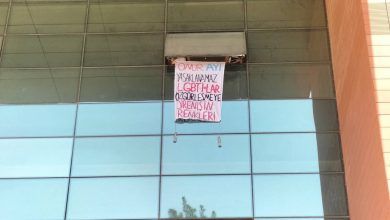Click to read in Turkish.
*Elif Akyol
We spoke with Medipol University student Ebrar about the student protests after their friend, Ayşenur Halil, was murdered by a man.
The protests of female students at universities after the murder of Ayşenur Halil and İkbal Uzuner by a man named Semih Çelik were to raise voices against violence against women and to grow and live the slogan that “femicides are political.”
We interviewed Ebrar, a student at Medipol University, where Ayşenur Halil is a sophomore in the Department of Media and Visual Arts, about these demonstrations, the causes behind them and the future of the women’s movement at the university.
Ebrar’s stories revealed the difficulties of the women’s movement at Medipol University, the students’ resistance for the name of gender equality, and the approach of the school administration during this process. It is clear that the struggle for women to organise in universities needs to be expanded. The formation of a stronger women’s movement against male violence and femicide will be possible with the increase in the number of such demonstrations and the growth of resistance and solidarity.
How did you organise the demonstration, and what for?
Ayşenur Halil’s friends organised the demonstration in her department and was a call to all Medipol students. The call was to not remain silent about femicides, to make the voices of ignored women who were murdered to be heard and to demand accountability. While the main reason for the demonstration was women’s anger, I also see the fact that Ayşenur Halil, one of the murdered women, was our classmate from Medipol as having a significant impact.
How was the women’s movement in Medipol before the protest for Ayşenur and İkbal, and what steps should be taken to ensure this activism continues?
There was never a ground for a women’s movement at Medipol before the murder of Ayşenur and İkbal. With this demonstration, we all saw the importance of having a women’s movement at our university. A solid ground for this has yet to be formed, but keeping the existing anger alive and women coming together, organising and creating a network of struggle will pave the way for a women’s movement to emerge.
How did the university administration approach this action? What was the administration’s reaction? And what are your views on this attitude?
Rather than seeing this action as women’s rebellion and holding the perpetrators accountable, the school administration saw it as a “commemoration program for İkbal Uzuner and our university student Ayşenur Halil” and shared it on social media. During the demonstration, after the press releases, students chanted slogans. They were often interrupted and asked to drop the banners for the memory of Ayşenur Halil and İkbal Uzuner at the memorial corner and leave the area.
What challenges do you face regarding women coming together and making their voices heard in their demonstrations at the university?
Apart from the ‘UNESCO Chair on Legal Protection of Women and Education of Women Entrepreneurs’, established last year at Medipol University but not yet active, no institutions aim to protect women and prevent sexual harassment. There are no clubs for the women’s movement or any student movement. Medipol’s political line and management, which aim to create “apolitical students”, are also the reason behind this. First, women must establish a club or come together in any club and build a network. Then, calling for solidarity from every woman and LGBTQI+ Medipol student will ensure the growth and progress of the movement.



